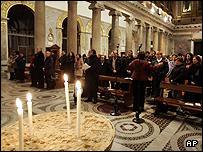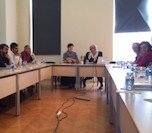Yesterday's headline in a Turkish tabloid was a worrying example of the interpretation of current affairs in a manner which reinforces a sense of victimhood as well as nationalist aggression in Turkey. The article in question was a reaction to the fire in Ludwigshafen, Germany, which had killed nine Turks, five of them children. The cause of the fire is as yet unknown.
German criticism of Turkish prejudice
The German press has been commenting on Turkish reactions to the fire, saying “the Turkish media is prejudiced and Erdogan has confused mourning with elections,” referring to the wide-spread belief in Turkey that the fire in Germany was neo-Nazi arson, and also referring to Prime Minister Erdogan’s speech in Cologne, in which he opposed assimilation.
The Westdeutsche Zeitung in Germany had criticised a “prejudiced Turkish press” and the fact that Erdogan seemed to use the occasion of the funeral for too much speechifying. The Flensburger Tagesblatt had also written about Erdogan’s mistiming, confusing mourning and election campaigning.
Partly in reaction to this, the tabloid newspaper Günes (Sun) made disturbing comments about the fire in Germany this month which killed nine Turks and the murder of journalist Hrant Dink in Turkey last year on its front page yesterday (12 February).
Inciting to racism
Its headline read, “9 Turks are not considered worth 1 Hrant”, followed by the following text: “When Hrant Dink became the victim of a heinous assassination, Turkey stood up in protest. But for the 9 Turkish victims of Nazis, no one is raising their voice.”
It is not difficult to translate the headline into what the editors of the newspaper really think, i.e. “9 Turks were not considered worth 1 Armenian.” It is ironic that the newspaper complains about lack of empathy for “Nazi victims”, although arson has not been proven and investigations into the cause of the fire are continuing, while at the same time encouraging another kind of racism.
It is precisely this kind of racism which has led to the murders of priest Andrea Santoro, journalist Hrant Dink and three Christian publishers in Malatya.
Accusing Germany and Turkey of hypocrisy
Referring to the crowds in front of the court building at the third hearing of the Dink murder case on 11 February as well as the crowds at his funeral last year, the Günes said: “At least as heinous an attack was experienced in Germany. Nine Turks died when their house was burnt down. Their names were Ilyas…Belma…Karanfil….When they were buried in Gaziantep yesterday, there were no tens of thousands of people who ‘felt the pain in their heart.’
The newspaper was also incensed at the fact that Germans did not march saying “We are all Turkish,” again a reference to the funeral procession of Hrant Dink, where people had carried banners of empathy, saying “We are all Hrant, we are all Armenian.” Günes also accuses the German media of a cover-up.
The newspaper is thus perpetrating the common Turkish nationalist discourse of looking for enemies without and within.
A very different interpretation...
In a very different vein was the article by Mehmet Yilmaz in the Hürriyet newspaper yesterday (12 February). He pointed out that because of the possibility of a racist attack, there were German representatives at the funeral in Gaziantep. He added:
“Priest Santoro was killed in Trabzon as the result of a religious-racist attack. No high-level state official participated in his funeral.”
“Hrant Dink was killed in a religious-racist attack. The Prime Minister visited the Dink family in their home to express his condolences after the funeral. You imagine why he could not attend the funeral and why he felt he had to express his condolences behind closed doors.”
“The Turkish and German Christians working in a bookshop which published bibles in Malatya were slain in a religious-racist attack, three people died. There were no state officials at the funerals.”
Media reinforcing racism and xenophobia
A regional newspaper in Gaziantep, where all the nine fire victims were from, the Hakimiyet newspaper, reported on the funeral. It quoted the German ambassador Eckart Cuntz in Ankara, who attended the funeral, as saying: “The people who lost their lives where the children of both the cities of Gaziantep and Ludwigshafen.”
The mayor of Greater Gaziantep, Asim Güzelbey, was cited in the same article: “On my visit to Germany immediately after the fire, I saw that German society was at least as affected as we were by the event. I saw that everything is being done to find the cause of the event. I want this to be known.”
However, as if ignoring these mutual expressions of respect and goodwill, the newspaper then chose to head the article thus: “From the German Hell to God’s Heaven”…
Regional and national newspapers have not grasped the concept of peace journalism, which is vital in the struggle against racism and xenophobia. It is high time they did, however; otherwise how can we understand who is sowing the seeds of discord? (EÖ/TK/AG)















